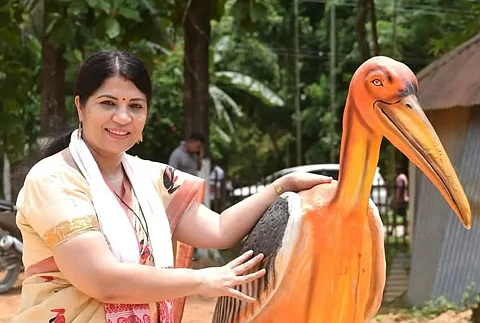
- Home
- Live Blog
- Breaking News
- Top Headlines
- Cities
- NE News
- Sentinel Media
- Sports
- Education
- Jobs

Heramba Nath
(herambanath2222@gmail.com)
Dr Purnima Devi Barman, a biologist from Assam, India, has earned global recognition for her exceptional work in wildlife conservation, particularly for her efforts to save the endangered greater adjutant stork. Her remarkable contributions to environmental protection were honoured when she was awarded the prestigious United Nations Environment Programme’s (UNEP) Champions of the Earth award, one of the highest international honours for environmental work. Dr Barman’s achievement is not only a personal triumph but a victory for Assam, India, and the entire global environmental community. It serves as a shining example of how grassroots, community-driven conservation efforts can lead to tangible, sustainable change.
The greater adjutant stork, locally known as hargila, is one of the world’s rarest and most endangered bird species. Once found in abundance across the Indian subcontinent, the bird’s population has dwindled dramatically, with fewer than 1,000 individuals remaining in the wild. Habitat destruction, human encroachment, and the loss of wetlands have significantly threatened the species, and many local communities viewed the storks as symbols of bad luck, leading to the destruction of their nests. However, Dr Barman saw an opportunity to not only save the species but to transform local perceptions about the bird and the environment.
Dr Barman’s approach to conservation is unique because it focuses on involving local communities in the process. Rather than imposing top-down strategies, she engaged with the people of Assam, recognising that community participation was essential for long-term success. Her innovative work led to the creation of the Hargila Army, a group of over 10,000 women from rural Assam who are now actively involved in the conservation of the greater adjutant stork. These women, who were once unaware of the bird’s significance, are now guardians of the stork’s nesting sites, helping to protect the species and advocate for its conservation.
The Hargila Army stands as a powerful symbol of grassroots empowerment. Dr Barman’s efforts have created a profound sense of ownership and pride in the local communities, especially among women, who have become the driving force behind conservation efforts. These women are not only protecting the storks but are also earning an income through hargila-inspired crafts and weaving, thus improving their socio-economic status and contributing to the broader well-being of their communities. Through this dual focus on conservation and economic empowerment, Dr Barman has transformed the lives of many women while ensuring the survival of the greater adjutant stork.
Dr Barman’s approach is deeply rooted in a holistic understanding of conservation. She understands that protecting endangered species requires more than just scientific knowledge; it requires an understanding of local cultures, values, and economic realities. By combining traditional ecological knowledge with modern conservation practices, Dr Barman has created a model that is both culturally sensitive and ecologically sound. Her work is not just about saving a single species but about fostering a broader environmental consciousness that includes both people and wildlife.
Her success extends beyond the protection of the greater adjutant stork. Dr Barman has set an example of how local communities can be both the beneficiaries and the stewards of their natural resources. She has shown that conservation can coexist with economic development and social empowerment, particularly through gender-sensitive approaches. Dr Barman’s work has not only protected a species but has also helped to improve the lives of thousands of people, particularly women, in rural Assam.
The recognition of Dr Barman with the UNEP Champions of the Earth award has elevated her to the ranks of the world’s leading environmentalists. This recognition is a testament to the power of community-based conservation and the effectiveness of grassroots efforts. Dr Barman’s work has not only brought attention to the plight of the greater adjutant stork but has also placed Assam at the forefront of innovative, people-centred environmental protection. Her approach is now being looked to as a model for other conservation initiatives worldwide.
Dr Barman’s impact is far-reaching, demonstrating that environmental protection is not just the responsibility of governments or large organisations but can be driven by local communities. Her efforts in Assam have inspired others to look for creative, inclusive solutions to environmental challenges, proving that conservation does not have to be a top-down process but can be a collaborative effort. Dr Barman has sparked a global movement that connects people, empowers them, and fosters a sense of responsibility toward the natural world.
Dr Barman’s exceptional leadership and innovative approach to conservation have earned her a well-deserved place among the world’s most esteemed environmentalists. Her work with the greater adjutant stork is not only a conservation success but also a model of community-driven, inclusive, and sustainable environmental protection. As a proud representative of Assam, Dr Barman’s achievement serves as a beacon of hope and an inspiration to people everywhere, demonstrating that with passion, dedication, and a sense of shared responsibility, we can all contribute to safeguarding our planet and its invaluable biodiversity for future generations. Dr Barman’s legacy is not simply about saving a species but about igniting a movement that has the power to bring about global change.